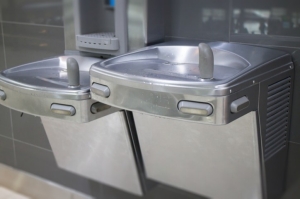School Drinking Water Testing Law and Reporting Form
Why is it important to test water for lead?
- Lead is a toxic metal that is especially harmful to children. More information about the health effects of lead can be found in the Drinking Water Fact Sheet.
- Testing of lead in drinking water helps evaluate plumbing systems and materials so that targeted remediation efforts can be taken.
- It is a key step in understanding the problem, if there is one, designing an appropriate response, and reducing children’s exposure to lead.
What are the sources of lead in school drinking water?
- Lead can enter your school's drinking water as it travels through lead connecting service lines and your school's internal plumbing and fixtures, especially those that were installed prior to 1988 (the effective date of the “lead free” act).
- Faucets that provide water used for consumption including drinking, cooking lunch, and preparing juice may contain lead.
What does Tennessee law require?
Testing for Lead in Public Schools' Drinking Water
In May 2018, the Tennessee Legislature passed a law (www.tn.gov/content/dam/tn/education/legal/legal_state_statuatory_rights_of_parents_and_students.pdf) requiring schools to implement policies to test for lead in drinking water sources in schools.
Key points from the law are:
- The legislation takes effect January 1, 2019.
- Each local board of education is to develop a policy to implement testing of drinking water in their schools.
- Testing is to occur in schools constructed prior to January 1, 1998.
- If results are equal to or greater than 20 parts per billion (ppb), the school shall conduct testing on an annual basis until retesting confirms the level is less than 20 ppb.
- If results are equal to or greater than 20 ppb , in addition to removing the drinking water source from service until retesting confirms results less than 20 ppb, the school is to notify the following within 24 hours:
o the Commissioner of Environment and Conservation,
o the Commissioner of Health,
o the county department of health,
o the local governing body, and
o the Department of Education. - If results are equal to or greater than 20 ppb, the school must notify parents and guardians of students enrolled at the school in accordance with a notification policy developed by the local board of education within 5 business days of the test result.
- If results are equal to or greater than 20 ppb, retesting of the lead level of the drinking water source must occur within 90 days of any corrective action.
For additional information on Tennessee requirements or to submit your results, use this link: https://stateoftennessee.formstack.com/forms/lead_testing_of_school_drinking_water_reporting or click the reporting button below.
How to test your school's drinking water for lead.
1. Use the Lead Testing in Schools and Child Care Centers (LTSCC) Program to test your school for free. Visit the LTSCC Program page here.
2. If you prefer to test on your own, consult U.S. EPA's 3Ts for Reducing Lead in Drinking Water linked below in the Additional Resources section.
Additional Resources
Tennessee Department of Environment and Conservation
Drinking Water Program
www.tn.gov/environment/topic/wr-wq-water-quality
Centers for Disease Control and Prevention
Drinking Water
www.cdc.gov/drinking-water/
Healthy Schools
www.cdc.gov/healthy-schools/about/index.html
Water Access in Schools
www.cdc.gov/school-nutrition/water-access/
Childhood Lead Poisoning Prevention Program
www.cdc.gov/lead-prevention/php/about-clppp/
National Association of State Boards of Education
How States are Handling Lead in School Drinking Water
www.nasbe.org/how-states-are-handling-lead-in-school-drinking-water/
Environmental Protection Agency
3T's for Reducing Lead in Drinking Water Manual
English: www.epa.gov/system/files/documents/2024-11/epa-3ts-guidance-document-english-508-compliant.pdf
Spanish: www.epa.gov/system/files/documents/2024-11/epa-3ts-guidance-document-spanish-508-compliant.pdf
Drinking Water Activities for Students and Teachers
www.epa.gov/ground-water-and-drinking-water/drinking-water-activities-students-and-teachers
Tennesee Department of Health
Childhood Lead Poisoning Prevention Program
www.tn.gov/health/health-program-areas/fhw/tn-clpp.html
TNCLPP Report: School Drinking Water Testing Results Based on Reporting Requirements (as of August 2022)

